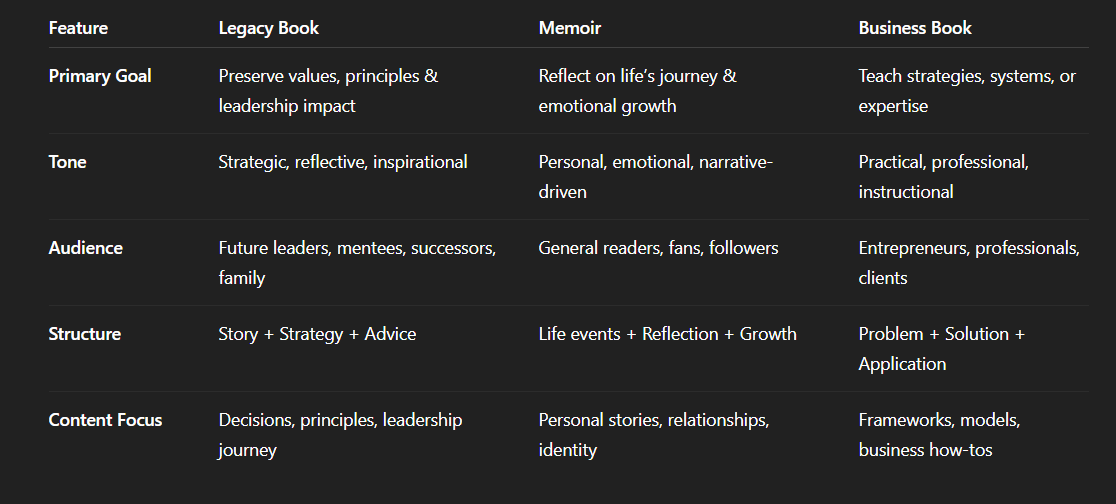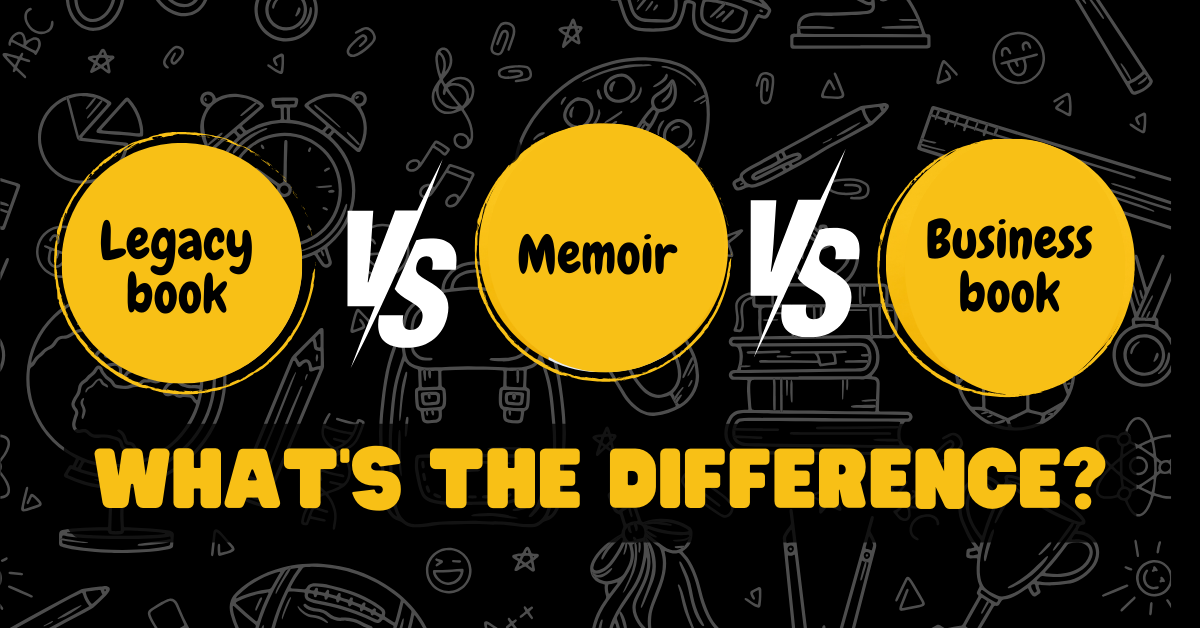Before You Write, Know What You’re Writing
If you’re a CEO, entrepreneur, or seasoned leader, there’s a good chance you’ve considered turning your life’s work into a book.
Maybe you want to capture the lessons you’ve learned.
Maybe you want to cement your thought leadership.
Or maybe you just want to leave something meaningful behind.
But here’s where many leaders get stuck before they begin:
“Should I write a memoir? A business book? Or something else entirely?”
The answer depends on your message, your audience, and your long-term goals.
In this article, we’ll explore the three most common types of books leaders tend to write—Legacy Books, Memoirs, and Business Books—and help you choose the right one for your story.
What Is a Legacy Book?
A Legacy Book is a leadership-centered book designed to preserve your values, principles, and philosophy in a way that outlives you.
It’s not just about your life story—it’s about the wisdom you’ve gained through experience, and how others can apply that wisdom in their own journey.
A Legacy Book typically includes:
Your leadership journey: key decisions, pivotal challenges, and milestones.
The principles and frameworks that shaped your success.
Strategic insights about your company or industry.
Advice for successors, mentees, or future generations.
A vision for the future—of your business, legacy, or mission.
It’s not just a story. It’s a blueprint. It reads like a conversation between you and the next generation of leaders.
📌 Ideal for:
CEOs and founders stepping down or transitioning.
Entrepreneurs who’ve built something worth passing on.
Visionaries who want to be remembered for more than numbers.
📘 Real-life example: “Principles” by Ray Dalio—a blend of memoir, strategy, and leadership philosophy.
What Is a Memoir?
A Memoir is a deeply personal, reflective book that captures moments, memories, and emotions from your life. Unlike a Legacy Book, a Memoir focuses more on the storytelling experience than the strategic impact.
While it can include business anecdotes, the goal is often to explore identity, change, and transformation.
A Memoir typically includes:
Major life events: childhood, personal struggles, turning points.
Emotional reflections: what you felt, feared, loved, or lost.
Honest storytelling, often with vulnerability and humor.
A message or theme that ties your story together.
A memoir is designed to resonate emotionally—not necessarily to instruct.
📌 Ideal for:
Leaders who’ve overcome major life challenges.
Public figures whose stories will inspire general audiences.
Individuals looking to document a full, rich personal life—not just the business side.
📘 Real-life example: “Becoming” by Michelle Obama—a memoir about identity, family, and personal growth, with light touches of leadership.
What Is a Business Book?
A Business Book is focused on teaching specific strategies, skills, or frameworks. It’s usually practical, topic-driven, and intended to be a guidebook.
While you may include some personal experiences, the emphasis is on delivering actionable insights that readers can apply in their business or career.
A Business Book typically includes:
How-to strategies for marketing, growth, leadership, or sales.
Frameworks, models, and principles others can follow.
Industry trends and lessons learned.
Case studies and data-driven insights.
You become the expert teaching others how to do what you’ve done—without needing to tell your whole life story.
📌 Ideal for:
Consultants, coaches, and speakers.
Entrepreneurs building a personal brand.
Professionals looking to build authority in a specific niche.
📘 Real-life example: “Start with Why” by Simon Sinek—a structured book on leadership philosophy and motivation in business.
What’s the Difference Between the Three?
Let’s break it down in a quick comparison:

Which One Should You Write?
Here’s how to choose:
✳️ Write a Legacy Book if:
You want to pass down your leadership philosophy.
You want your company culture or strategic vision to outlast you.
You’ve built something great and want to teach why it worked.
You care less about telling every personal detail—and more about impact.
👉 This is what Lodrify specializes in. We help leaders craft strategic, reflective, legacy-defining books that go far beyond memoirs or guides.
✳️ Write a Memoir if:
You’ve had a transformative life experience and want to share your emotional journey.
You’re writing for a general audience, not just professionals.
You want to capture your voice, your memories, your growth—in your own way.
✳️ Write a Business Book if:
You want to teach something practical: sales systems, leadership frameworks, growth strategies.
You’re focused on building your authority or driving business visibility.
You’re less interested in personal storytelling—and more in being seen as an expert.
Can You Combine Them?
Absolutely—but do it intentionally.
Some of the most powerful books blend elements of all three:
A Legacy Book with business strategy and personal anecdotes.
A Memoir that leads into a leadership framework.
A Business Book that starts with the story of why the framework exists.
The key is knowing which style leads, and which supports.
Conclusion: Your Story Has Power. Just Choose the Right Format to Tell It.
Writing a book isn’t just about documenting what happened. It’s about making meaning of it—for yourself and for others.
So whether you’re trying to:
Inspire your children and company’s future leadership,
Reflect on a life of impact,
Or teach a new generation how to lead like you did…
There’s a format that fits your voice.
At Lodrify, we specialize in Legacy Books—because we believe your leadership deserves more than just a chapter in a business manual. It deserves a standalone book that becomes your personal monument to impact.
📘 Ready to begin yours?
👉 Book a Free Legacy Consultation with Lodrify and let’s turn your principles into pages.
Decided to write a Legacy Book? Here’s how to start.


Leave a Reply